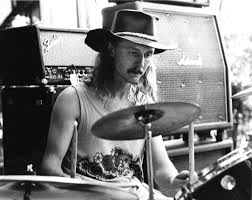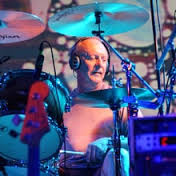
25 Jan Allman Brothers’ Butch Trucks Dies; Hanson Looks Back
Butch Trucks, original member and drummer for the Allman Brothers Band, died yesterday at the age of 69. The Allman Brothers Band came to Telluride for the first time in 1991 for Bill Graham’s legendary Mid-Summer Festival. Geoff Hanson was a 21-year-old reporter when he interviewed Trucks. Hanson went on to write, produce and star in the Telluride cult film “Scrapple” and has been writing about music for over 25 years.

Geoff, dancing fool at Ride Fest 2016.
“This was my first big interview with a legendary ’60s rock star,” Hanson said. “It was a big deal for me. I’ll never forget it. I can imagine in my head the whole scene. He was in Europe and I remember when the call connected and I heard his voice and I said, ‘Butch, are you there?’ That was kind of the beginning for me.”

Geoff Hanson as King of Hearts, Dead & Company, Boulder, 2016.
Geoff Hanson is now director of development at KOTO Radio, where he has been a deejay since Valentine’s Day 1991.
“Deejaying” is better than a powder day,” he said.
Read on for a walk down memory lane – and a wonderful tribute to Trucks’ memory.
He was born a Ramblin’ Man.
It’s been 20 years since Duane Allman died, yet the torch of the Allman Brothers band still burns brightly. The four original surviving members of the Allman Brothers – keyboardist and vocalist Greg Allman, Dickey Betts on guitar and Butch Trucks and Jaimoe on drums – continue to turn out powerful music.
Butch Trucks nowish.
They recently teamed up with guitarist Warren Haynes, bassist Allen Woody and former Spyro Gyra percussionist Jeff Quinones and recorded “Shades of two Worlds,” the follow up to the Allman Brothers 1990 effort, “Seven Turns,” which earned the band a Grammy nomination for the track “True Gravity” as Best Rock Instrumental. The band received the “Comeback of the Year” award in the Rolling Stone Readers Poll. “Shades of Two Worlds” was released July 2 by Epic records.
The Times-Journal’s Geoff Hanson spoke with drummer Butch Trucks in Copenhagen, Denmark during the band’s recent European Tour.
GH: What’s it like to be still playing together after 23 years? Does it get tiring at all?
BT: Hell, it’s better than ever. We didn’t play together for about eight years (1981 through 1989) and since we got the band back together with some new people, it’s just been great. It’s the first time in a long time that we’ve had a band where everyone is pointing in the same direction, where our energy’s been spent focused on the same thing. We don’t have anything pulling us in different directions – that’s really been the problem since Duane and Berry died. There was always a little “let’s go this way” and “let’s go that way.” When we started up again in 1989 we told Epic that if we were going to do it, we didn’t want any input from them, and they agreed, and we found people that have the same vision we did, and it’s been great. Right now, I think we’re playing better than we ever have, at any time and I’m having a ball with it.
GH: Tell me about Mark Quinones. I’ve seen bands with two drummers, but two drummers and a percussionist is a lot of backbeat!
BT: Mark came from the band Spyro Gyra. I saw them play and I was just blown away by his playing and I thought, ‘wouldn’t it be cool if we could bring in a percussionist on top of Jaimoe and me.’ Everyone agreed to it, so we asked him to join and he did. He comes out of the Salsa world so he brings some really cool flavors to the mix. He’s half our age and can really play.
Allen and Warren also bring some new energy into the band. That’s been good for the rest of us.
GH: Duane died in 1971 and Berry a year later in 1972. The band stayed together for four more years and really that was the time the Allman Brothers enjoyed the most commercial success, until you broke up a 1976. After that you tried another comeback, but that didn’t work out. How do you look back on those years?
Butch Trucks then.
BT: In 1974 and 1975 we were the top touring band in the country, but I don’t know if musically we were doing much. We were all caught up in that rock ‘n’ roll fantasy, and in 1976 we decided it just wasn’t fun anymore, it’s time to get away from it. We got back together in ’78 and that just didn’t work out, the chemistry wasn’t right and we got with the wrong record company (Arista). For a lot of different reasons, we were not real proud of what we did at that time. I think the ’80s just wasn’t a time for the Allman Brothers. People wanted to hear computers, not bands. It was really bad for drummers!
GH: There are a better number of ’60s bands getting back together recently. Is this just another come back or do you feel that you have something fresh and you want to offer people?
BT: If we didn’t, we wouldn’t be doing it. That was what we agreed when we started this thing – It’s not going to evolve if it’s not gonna be better if it’s not gonna be another nostalgia trip then we’ll do something else as soon as it looks like that’s happening will stop doing it.
GH: Are you happy with the new album?
BT: I think it progresses from where “Seven Turns” left off. We got kind of looser with it. There’s a couple fairly long tunes in it. There’s an instrumental called “Nobody Knows,” which is kind of along the lines of “Whipping Post.” There are a couple of straight on rock ‘n’ roll tunes. The single’s called “End of the Line” and it was picked up by 138 stations and is doing pretty well.
We also did a little tribute to Charlie Parker and Miles Davis called “Kind of Bird.” The joke in rehearsal was that we finally wrote a song that we couldn’t play. Everywhere we go people comment on how intense this record is, and how much more like the early stuff this is than “Seven Turns.” I thought “Seven Turns” was great. I thought we were going to have a hell of a time beating it, but I think we have.
GH: Excluding the last two records, when you look back on all the albums the Allman Brothers have made, what’s your favorite?
BT: I don’t know, probably the live ones — “Live at Fillmore East” because we work much better live than we do in the studio. Making a studio album is more of a craft, whereas the live playing is the art. That’s where you can really be adventurous and spontaneous — stretch out and communicate with one another, when you’re in the studio you have to be much more careful.
The current band we have is not careful at all! We’re playing as well as we have or have live.
GH: Speaking of Live at the Filmore East, Bill Graham is producing these shows, tell me about him.
BT: Bill’s the best ever. That’s all you gotta know. He’s done more for the Allman Brothers Band than anybody.
GH: Ever been to Telluride?
BT: Nope. I hear it’s a beautiful place. Bill is the one who told me that. We can’t wait.




Sorry, the comment form is closed at this time.